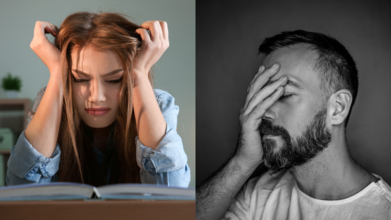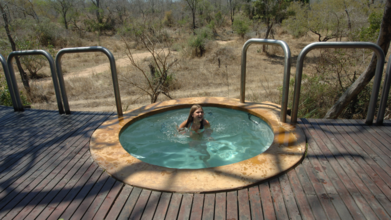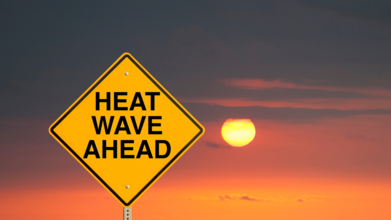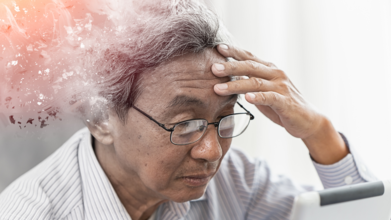- Health Conditions A-Z
- Health & Wellness
- Nutrition
- Fitness
- Health News
- Ayurveda
- Videos
- Medicine A-Z
- Parenting
- Web Stories
Microstress Is Real: These Tiny Terrors Are Quietly Wrecking Your Mental Health

We often associate stress with dramatic breakdowns, overwhelming work, or emotional turmoil. But what if the real danger lies in the tiny, everyday pressures we don’t even notice building up?
What Is Microstress and Why It Matters
“Stress is the most notorious yet underplayed disease,” says Alma Chopra, motivational speaker, disability rights activist and life coach. “It’s often thought of as an emotional onslaught that makes it difficult to function. But stress isn't just limited to our emotions; we can also become physically stressed from a chronic illness or an injury.”
Alma explains that microstresses are small, fleeting moments of stress that sneak into our daily routines. “Sometimes it creeps up through daily pressures until we hit our melting point. These are called microstresses,” she shares. These could include running late for a meeting or scrolling social media right after waking up. They may feel harmless in the moment but layer up to become chronic stress over time.
How Microstresses Mess With You
“These reactions feel minor and temporary, so they're quickly replaced by the next task or eased by a smiling face or a piece of cake,” says Alma. But the danger lies in how these minor stressors build up over time. “We tend to ignore these micro-stresses, but over time, they build low-level tension that will affect your sleep, focus, mood and health.”
Alma lists common microstressors and their effects:
- Alarm: “Jerks the body into a sudden state of alertness, disrupting natural rest.”
- Checking work email: “Doing this first thing in the morning puts us into a state of panic and anxiety.”
- Scrolling social media: “Overstimulates the brain and drains mental focus.”
- Confrontations: “Force us to deal with discomfort we’re not emotionally prepared for.”
- Unfinished tasks: “Juggling a long list without breaks builds pressure and leads to burnout.”
- Bruising your knee: “Even minor damage to the bone or soft tissue creates physical stress in the body.”
Alma advises recognising patterns and creating little routines to manage stress before it spirals. “Begin by recognising patterns, checking what drains you and creating little routines to relieve stress,” she says. “Start taking short breaks, creating boundaries and incorporating rejuvenating practices into your day.”
When Lifestyle Fuels Microstress
Sukirti Midha, spiritual wellness coach and founder of Sukh Yog, points out that microstress is a lifestyle issue. “Micro stress, as the name suggests, is small things we face as a working person or a householder. No gender age or designation we are discussing here; it’s the same for all,” she says.
According to Sukirti, “It’s in our lifestyle now; still, we are not aware of it.” She adds that people often don’t even feel it building up. “Do you think it happens overnight? No, nothing happens overnight except the sun comes out,” she jokes, adding a serious note that many people today don’t even see the sunrise, contributing to deficiencies like vitamin D.
Sukirti points out how society’s pressure to look good and maintain appearances feeds microstress. “When one gets conscious about looks, which include not only clothes but also touch-ups, make-up and hair. It’s not social pressure but created by us only.” She questions why people rely on external validation to feel good. “Why is it always important to look good to feel good?”
She also flags social media’s impact. “Many social media applications have filters to make you feel more beautiful and younger, which gives you plenty of stress when we look back in a basic mirror.” Comparing ourselves to others’ curated lives triggers a subtle but ongoing sense of inadequacy.
“Maintaining a status is a pressure these days,” she says. “Always remember as we shift from past to present or future to present, we learn happiness is about you & not the things or society status.”
The Simple Way Out
Both experts agree that while microstress can’t always be avoided, we can manage it better by slowing down, drawing boundaries and valuing simplicity. As Sukirti says, “Staying away from microstress isn’t easy, but preferring solace is an easy way out.”
6 Surprisingly Cool Benefits of Taking a Cold Plunge

We know. We know. Willingly dipping yourself into freezing water is not everyone's idea of a good time. In fact, it’s the stuff most nightmares are made of. But people are queuing up to do it. Whether it’s a tub full of ice cubes or a freezing lake at 6am, cold plunges are a thing. While you will be surprised to know the benefits, first know what exactly happens when you put your body through this temporary torture.
From giving your mood a caffeine-free lift to helping muscles relax, here's what makes cold plunging the icy wellness trend for your body and brain.
1. Boosts Your Mood
A few minutes in icy water can deliver a euphoric high. That’s because cold exposure triggers a rush of endorphins, your body’s natural feel-good chemicals. It also reduces cortisol, the stress hormone. Some studies even suggest that cold water immersion can help ease symptoms of depression and anxiety.
2. Recovers Muscles
Ever wonder why athletes dunk themselves in icy baths post-game? Cold plunges help reduce inflammation, speed up muscle recovery, and soothe soreness. When you expose your body to extreme cold, blood vessels constrict. Once you’re out and warming up, they dilate, increasing blood flow to tired muscles.
3. Improves Sleep
Taking a cold plunge can actually help you sleep better. Post-immersion, your body enters a state of deep relaxation once it warms back up. Your nervous system settles down, and your sleep hormones kick in more efficiently.
4. Boosts Immune System
Regular cold plunges may also give your immune system a little kick in the pants. The cold stimulates white blood cell production, which helps your body fight off illness. Some studies have found that people who practise cold water immersion regularly tend to get fewer colds and recover faster.
5. Makes Your Skin Glow
Cold water tightens your pores, reduces puffiness, and boosts circulation to your skin. It’s basically nature’s version of a toner. Plus, by reducing inflammation and flushing out toxins, your skin is left looking brighter, fresher, and decidedly more awake than you feel.
6. Teaches You to Breathe
Ever tried to breathe normally when your body is screaming from shock? Cold plunges force you to master your breath. That slow, deep breathing you’re encouraged to do during the first freezing minute? It’s not just to stop you from panicking. It actually helps train your nervous system to stay calm under pressure, build mental resilience, and reduce anxiety over time.
In a nutshell, cold plunging isn’t just a weird wellness trend. It’s a full-body and mind experience that comes with some genuinely impressive health benefits. Yes, it’s uncomfortable. Yes, you’ll want to scream. But after a while, you might just find yourself looking forward to it.
UK Weather Warning: Do Not Ignore These Subtle Symptoms a Heatwave Can Bring

For a country that treats 23 degrees Celsius like it is the Sahara, the UK isn’t exactly built for this kind of heat. While most of us are busy Instagramming sunsets, our bodies might be quietly waving red flags. And that tiredness or weird headache is not just the heat; it could be your system slowly giving signs.
Here is what the heat could actually be doing to you and why you should not ignore it.
That Headache Is a Heat Alarm
You’ve drunk your water, you're not hungover, and yet your head’s pounding like you’ve been at a rock concert. Heat headaches are real, and they’re one of the first signs your body is overheating. So slam a glass of water, sit in front of a fan, and maybe ditch the hot coffee for something icy. It would help if you stuck your feet in a cold bucket like your gran used to do.
Sweat, Then No Sweat? That’s Trouble
At first, you’re drenched like you’ve run a marathon in your own kitchen. But then… nothing. You stop sweating. Your skin feels dry, hot and honestly a bit different. This switch can be dangerous. It’s a classic heatstroke sign. Do not ignore if you’ve been roasting all day and your skin is suddenly dry and flushed; that’s your cue to cool down fast. Think cold compress, wet towel, or even lying in a bath.
Muscles Twitching on Their Own?
Random leg twitches? Sudden tummy cramps while lying down doing absolutely nothing? That’s not just your body being weird; it’s heat cramps. They happen when you’re low on salt and hydration, and they can be surprisingly painful. DIY remedy: Bananas, electrolyte sachets, or if you’re fancy, coconut water.
Feeling Like You're About to Faint on the Road?
Heat dizziness is uncertain. One minute you’re grabbing grapes; the next you’re gripping the trolley like it’s your last hope. When it’s hot, your blood pressure can drop faster than your motivation on a Monday. If you suddenly feel woozy or like you’re in a bad dream, sit down before you fall down. Always carry a water bottle.
Can’t Think Straight? Not Just the Heat Making You Dull
If you’re suddenly mixing up names, forgetting simple words, or spacing out mid-text, that could be the heat messing with your brain. Mental fog, confusion, or even irritability are signs that your body is cooking from the inside. If someone is slurring, looking spaced out, or acting like they’ve had a few too many but haven’t, it could be heatstroke. Call for help.
Your Skin Feels Like a Radiator?
Hot, dry, and suspiciously flushed skin is not the summer glow you think it is. If your skin starts feeling like it belongs in an oven, it means your body’s not coping well with the heat. Especially if your pulse is racing and you feel weirdly calm. Get help. This is your body in SOS mode. Cool off immediately and don’t try to “push through it”.
Swollen Feet?
Heat can make your feet and ankles puff up like inflatable pool toys. It’s not you gaining sudden water weight; it’s literally your blood vessels acting up. So put your feet up, wear comfy shoes, and avoid salty snacks. That means no crisp binge while complaining about the weather.
Do Not Forget To:
- Hydrate well
- Draw the curtains always
- Sit in front of a fan for relief
- Avoid peak sun hours
- Don’t ignore what your body’s whispering
Neuroscientist Shares 3 Simple Lifestyle Changes That Can Delay, Or Even Prevent The Onset Of Alzheimer's

What is better than being able to ward off one of the most devastating brain diseases? And guess it did not necessarily involve a prescription or a breakthrough drug but simply tweaking your daily habits. That is the message Irish neuroscientist Dr. Sabina Brennan shared when she sat down with Davina McCall on the Begin Again podcast. With dementia cases in the UK soaring and projected to rise, her tips could not come at a better time.
Though the underlying causes of Alzheimer’s, the most common type of dementia, still puzzle experts, Dr. Brennan is certain of one thing: we have more control than we think. Through simple, everyday choices, we can give our brains a fighting chance.
Here is what she says we all should be doing:
1. Sweat It Out for a Sharper Brain
Dr. Brennan insists the real magic lies in movement. “Physical exercise is one of the best things you can do for your brain health,” she told Davina. That is not something most people expect to hear when it comes to dementia, but the link is undeniable.
The secret weapon here is a protein known as brain-derived neurotrophic factor, or BDNF. Think of it as plant food, but for your brain. “I call it ‘Miracle-Gro for the brain’. It makes it easier for you to grow new brain cells and new connections between them. And that is what you want in a healthy brain. Lots of brain cells and connections.”
She goes on to explain why that is so critical in the early stages of dementia. “If you get Alzheimer's disease pathology in your brain in the early stages, it is not about how much pathology, how much disease you have in your brain. It is about how much healthy brain you have to cope with that disease that will allow you to continue functioning for as long as possible.” So build up that mental muscle now, and you may buy yourself more time down the road.
2. Socialise More
If you needed a reason to chat with your neighbour or call your grandmother, here it is. “A challenging activity for your brain” is how Dr. Brennan describes conversation. “Your brain has to work hard. And that is really, really good.”
She is not talking about small talk alone. It is the deeper connections and dynamic conversations that really get the grey matter going. And crucially, she urges us to be intentional about who we socialise with.
“We tend to hang out with people of the same age as us,” she points out. “But there is no nice way to say it. As you get older, your age cohort will die off. And so people end up socially isolated through no fault of their own.”
Her solution? Build intergenerational friendships before it is too late. “We have to have more intergenerational friendships. And the research shows that everybody benefits in that case; younger people interacting with older people have to do something about that.”
Isolation is not only emotionally draining, she warns; it is mentally damaging too. And visiting older relatives should not be seen as a one-way street. “Visit them as an equal. Do not visit them as someone who is doing a good deed. Talk to them as an intelligent individual.” It is a brain-boosting strategy that doubles as a social fix.
3. Learn Something New
If you have been meaning to learn the ukulele or brush up on French, now is the time. Dr. Brennan’s rallying cry? “Go mental.”
“Learn something new because that is when you harness neuroplasticity,” she says, referring to the brain’s ability to reorganise and adapt. But she admits the word “learning” comes with baggage. “I just wish there was another word for learning because it has got such connotations about education and school and, for a lot of people, a lot of negative [connotations].”
Still, learning, in the broadest sense, is key. She even uses the simple act of opening a door to make her point. “When you open a door for the first time, you are learning how to open that door. Your brain is learning how much pressure to put on that door and how much force you have to push it.”
So, yes, Sudoku is great, but do not stop there. “Once you are good at it and you are comfortable, you have to push yourself to the next level. Go from a simple crossword to a complex crossword. Put a timer on so you do it more quickly. You know, you just have to keep challenging yourself. But it can be anything. If you play a musical instrument, learn another technique.”
Whether it is mastering a new recipe, joining a dance class, or finally tackling those cryptic crosswords, the goal is to keep your brain guessing.
And do not forget rest. Dr. Brennan wraps up her advice with one final reminder: all that mental hard work needs to be processed. “Getting enough sleep so your brain can effectively process and categorise all those new skills is crucial.”
We might not have a cure for Alzheimer’s yet, but according to Dr. Brennan, we are far from powerless. Move your body, keep your social circle diverse, and challenge your mind, not just to stay sharp, but to stay connected and alive. It is simple science with life-changing impact.
© 2024 Bennett, Coleman & Company Limited

